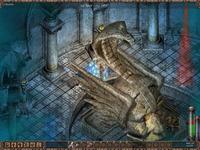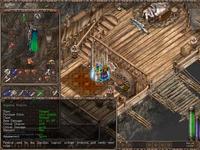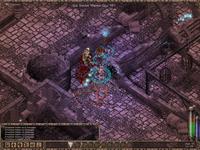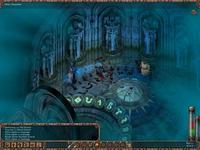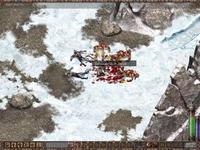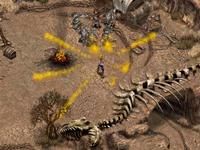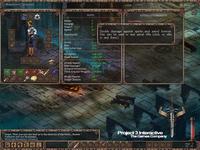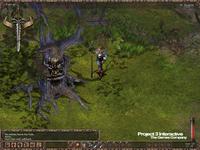|
|
|
Main News Forums Games Games Database Top 100 Release List Support Files Features Reviews Previews Interviews Editorials Diaries Misc Download Gallery Music Screenshots Videos Miscellaneous Staff Members Privacy Statement |
Kult: Heretic Kingdoms - Review
3D People's Kult: Heretic Kingdoms is based around an unusual idea: what if you represented an Inquisition against religion? This is the unconventional premise that kicks off a fairly standard action-RPG with some unconventional underlying mechanics. Along the way you'll get to undermine a sacred cow (or pig, actually), question the non-existence of god and of course - slaughter monsters by the cartload. Joining the Inquisition Kult places players as a young female initiate to the Inquisition, in an original fantasy world where god has been slain and religion outlawed. Following the death of the despotic religious leader the Theocrat some time ago, the Inquisition mercilessly hunts and destroys any sign of religious activity, leaving a scarred and bleak collection of lands known as The Heretic Kingdoms. The theft of a sword of religious significance raises the spectre of a secret religious cult and the player is tasked with recovering the artifact and exposing the cult. The game starts with a simple character creation process. There are four primary stats: Melee, Ranged, Magic and Speed. These stats are graded from 'F' - 'A' (F, F+, E-, E and so on) and a pool of points is used to raise the stats as desired, with 100 points advancing a stat by one grade. Melee, Ranged and Magic directly influence the damage from each of these attack types and Speed affects the Block and Dodge derived stats. Two starting Attunements - Kult's equivalent of skills - are chosen from an array and a starting elemental alignment (Fire, Water, Air, Earth) selected along with a small range of hairstyles and outfits. Choose a name for your hero and it's time to start. Adventuring in the Heretic Kingdoms At heart, Kult is an instantly recognisable isometric action-RPG, although beneath the standard exterior, 3D People has included some original ideas and anchored everything to a strong story that adds a sense of purpose lacking in many action-RPGs. While not everything fully succeeds, Kult's action is fairly solid and the story and questing elements are well conceived. 3D People teamed with consultants International Hobo to refine the story and dialogue and this seems to have been a successful move - adventure gamers may know International Hobo's founder Chris Bateman for his work on the brilliant Discworld Noir. Kult's world presents as quite dark with fractured politics and a sense that the religious Inquisition weighs on the population like a heavy blanket. Eschewing typical fantasy fair like conflicts with Elves or Dwarves, Kult tells an original tale of religious conflict as the player pursues the stolen sword and uncovers the truth behind the theft and the mysterious cult. In addition to dialogue and quests, the story unfolds through a series of stylish drawings, narrated by the outstanding Tom Baker. Along the way you'll meet many NPCs and undertake various quests and this is one of Kult's real strengths - nearly all the quests are tied to the main storyline, even side-quests that are used to flesh out the world or one of the characters - and this keeps the game focused and interesting. NPC interaction is through traditional dialogue trees, which offer some opportunity to roleplay the character as a harsh servant of the Inquisition or someone a little more forgiving. Essentially this allows the player to choose a moral path but refreshingly, it's never couched in terms of "good" or "evil". In a few cases, Kult offers the chance to choose different paths - allying with an apparent enemy or choosing whether some escaped slaves should be assisted or turned in for breaking the law, for example. These moments are great but could have been better exploited -there's only a handful of these junctures and in the main, the choices could have more impact on the gameplay. The story does remain interesting throughout but I would have liked more opportunity to explore all the themes and factions before the end suddenly looms. There are some nice humorous touches to the writing and quest design, with some gentle lampooning and a couple of pop-culture references, although the script has a habit of having the character make sardonic comments rather than leaving this to the player to control through dialogue choices. Kult takes place on a series of discrete maps, with around twenty major locations altogether. Walking to one of the exits on the edge of an area opens the overland travel map and players may instantly travel to any location currently on the world map. Talking to NPCs and finishing certain quests can reveal new locations. There are a couple of hub areas such as the town of Kyallisar from which a number of new locations open up allowing a degree of freedom but in general, Kult is linear. Each of the locations is unique, ranging from a rural village to a mountaintop town to frozen wastelands. In addition to the physical world, players can also enter the Dreamworld more or less at will. The Dreamworld is a spiritual plane that overlays the real world, inhabited by ghosts and spiritual monsters like Soulravens. There are a handful of quests that use the Dreamworld and of course, the denizens provide additional combat. It can also be used strategically to temporarily escape a fight, perhaps moving to another location before re-entering the physical world.
Getting Attuned The cornerstone of Kult's gameplay and is the Attunements system, which replaces traditional skills and magic spells. In the world of Kult, objects such as rings, weapons and armour hold powers or abilities that can be unlocked by using the item in combat, until the character is attuned to that ability. It takes around 10 minutes of combat to attune and once unlocked, the item is no longer needed for the Attunement to work. The number of active Attunements allowed at any time increases with the character's level and Attunements can be swapped in and out from the total pool discovered whenever the character rests at a campfire or certain safe locations. In this way, players can choose their favoured combinations or even "configure" the character for a certain encounter. There's a key strategic twist: many Attunements have a condition that must be met for the Attunement to work, such as "No Armour", "Melee" or an elemental alignment. In the case of elemental alignments, the character must be using a weapon of the correct alignment. For example, Fleet of Foot increases movement speed and is an air Attunement - it will only work in combination with an air weapon such as a Militia Air Bow. On the other hand, changing to a different weapon - say, a fire-aligned Shaman's Staff - will deactivate Fleet of Foot but any fire Attunements will instantly switch on. This opens up a gamut of possibilities: players may choose to specialise in one type of Attunement or combine different alignments, which can be accessed by switching weapons. Items that contain an Attunement to unlock are indicated but the actual Attunement is hidden, so players have no idea (at least the first play through) what abilities they may unearth next. This reveals another strategic decision: stick to your favourite weapon or equip that new sword that deals less damage but may contain a game-changing Attunement? Kult works best if the player tries to uncover as many Attunements as possible; it's fun to discover new ones and leads to a greater pool of skills to work with. It's also challenging using weaker weapons in the hope of finding a great new ability but players who like to plan a character in advance or roleplay a specialised character may not like this system. Kult is an action-RPG, so there's plenty of fast-paced combat, initiated with a simple right-click on enemies. You'll usually face enemies in small groups rather than the overwhelming hordes in some games and as already mentioned, there's some strategic depth in discovering and combining Attunements in an effective way. It's often worth adjusting the active Attunements to suit the situation - there's not much point in throwing fireballs at Fire Elementals. Since Kult's Attunements are basically passive, the key to getting the most out of the combat is hotkeying different weapons in a way that enables different groups of Attunements. This makes a huge variety of different attacks (and defences) available with a keypress, keeping combat interesting and offering flexibility to meet different enemies. There's a pitfall with this system: players who choose to specialise with one type of attack or who haven't unlocked a wide range of Attunements will find the combat lacks interaction. For example, there are only four elemental "spell" Attunements for each element and they're pretty similar: Ice Spiral and Ring of Fire are effectively the same except for the damage type. The healing system in Kult is also unconventional with health potions dispensed with altogether. Instead, characters are equipped with an unlimited herb pouch that represents some basic trail medicine such as bandages and simple medicinal herbs. Each time the herb pouch is used some "blood points" are lost and the healing is less effective - representing increasingly severe wounds that simple measures can't cure. Resting at a campfire restores all hit points. It's an effective system that feels fairly realistic without making characters invulnerable. Getting Technical Kult is an attractive game that combines 3D characters and effects with pre-rendered backgrounds. The backgrounds are nicely detailed with lots of little additional touches like trees and bushes moving in the wind, insects, birds and smoke curling from chimneys although occasionally some scenery items are painted in the background rather than using 3D objects, which looks awkward. The 3D characters are not as detailed but quite satisfactory and different armour and equipment is shown, along with capes. The art style itself is slightly unusual but I found it quite appealing. The animation is reasonable although mundane, lacking the spectacular combos and special attacks of some action-RPGs. Sound is quite a mixed bag. The orchestral soundtrack is generally good with a couple of excellent tracks, although the attack music can get repetitive, as is often the case. The sound effects aren't particularly memorable and the mixing is a little uneven with footsteps sometimes annoyingly loud while some attack sounds are a little muted. It's the voice acting of Tom Baker as the narrator that steals the show with a skilled performance. The interface is generally effective with the gameplay area unobscured and easy access to character, quest and Attunements screens all with simple layouts. The inventory is too small and although bags can be used to extend the space this means constantly moving items around. As shipped there were several problems with bags that were mostly ironed out with the v1.1 patch but otherwise I found the game stable and relatively bug-free. The lack of an in-game map is irritating, even though the individual areas aren't especially large. Time to go… While the final boss is a little underwhelming, there are six end-sequences and a slide at the end with some brief details of your exploits, along with a title based on the number of Attunements uncovered. With around 100 Attunements to find, there's some replay value in trying to discover them all, along with exploring different plot points. It's a little short at around 25-30 hours but in all fairness, there are plenty of successful games that are far shorter. The action-RPG market has been a little crowded lately but despite some shortcomings, I enjoyed Kult more than any other action-RPG I have played this year, thanks to the combination of original ideas and a strong story. The Attunements system is fun when fully exploited and the quests are superior to the meaningless fare often encountered in this genre. I'll certainly be keeping an eye on 3D People's next project.
Links
Rate this title and view comments Game Info Printer Friendly Version |
|||||||||||||||||||||||||||||||||||||||||||||||
|
All original content of this site is copyrighted by RPGWatch. Copying or reproducing of any part of this site is strictly prohibited. Taking anything from this site without authorisation will be considered stealing and we'll be forced to visit you and jump on your legs until you give it back. |
||






